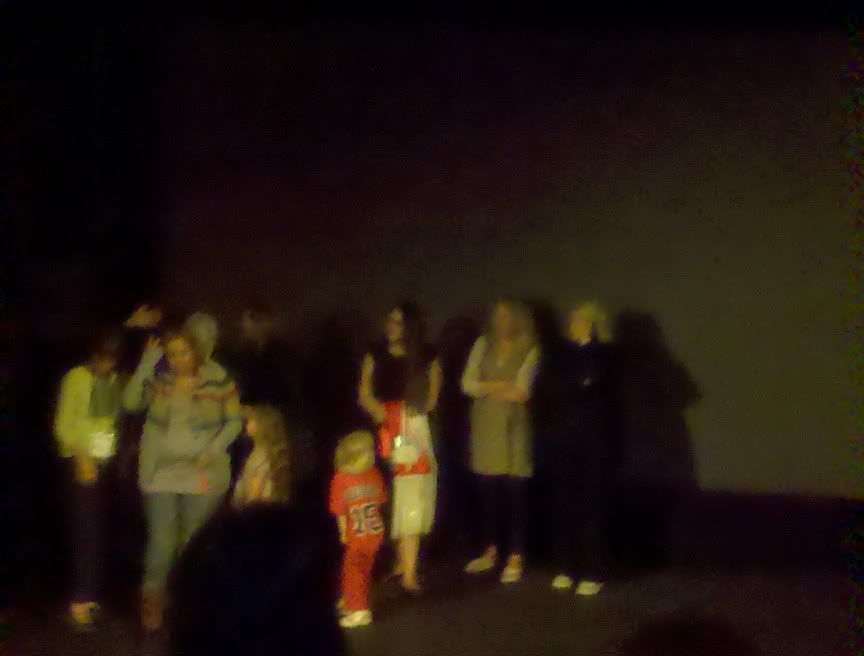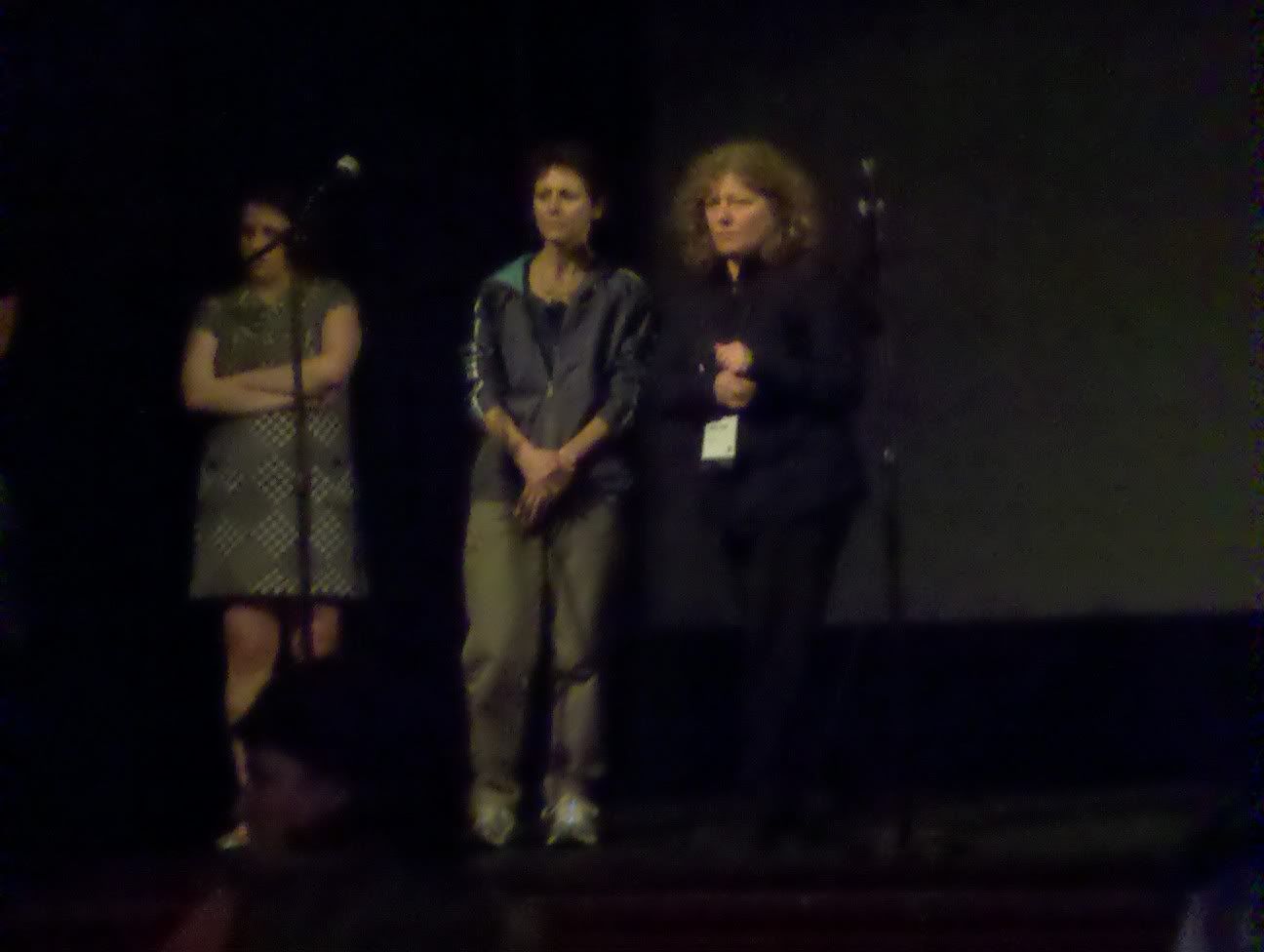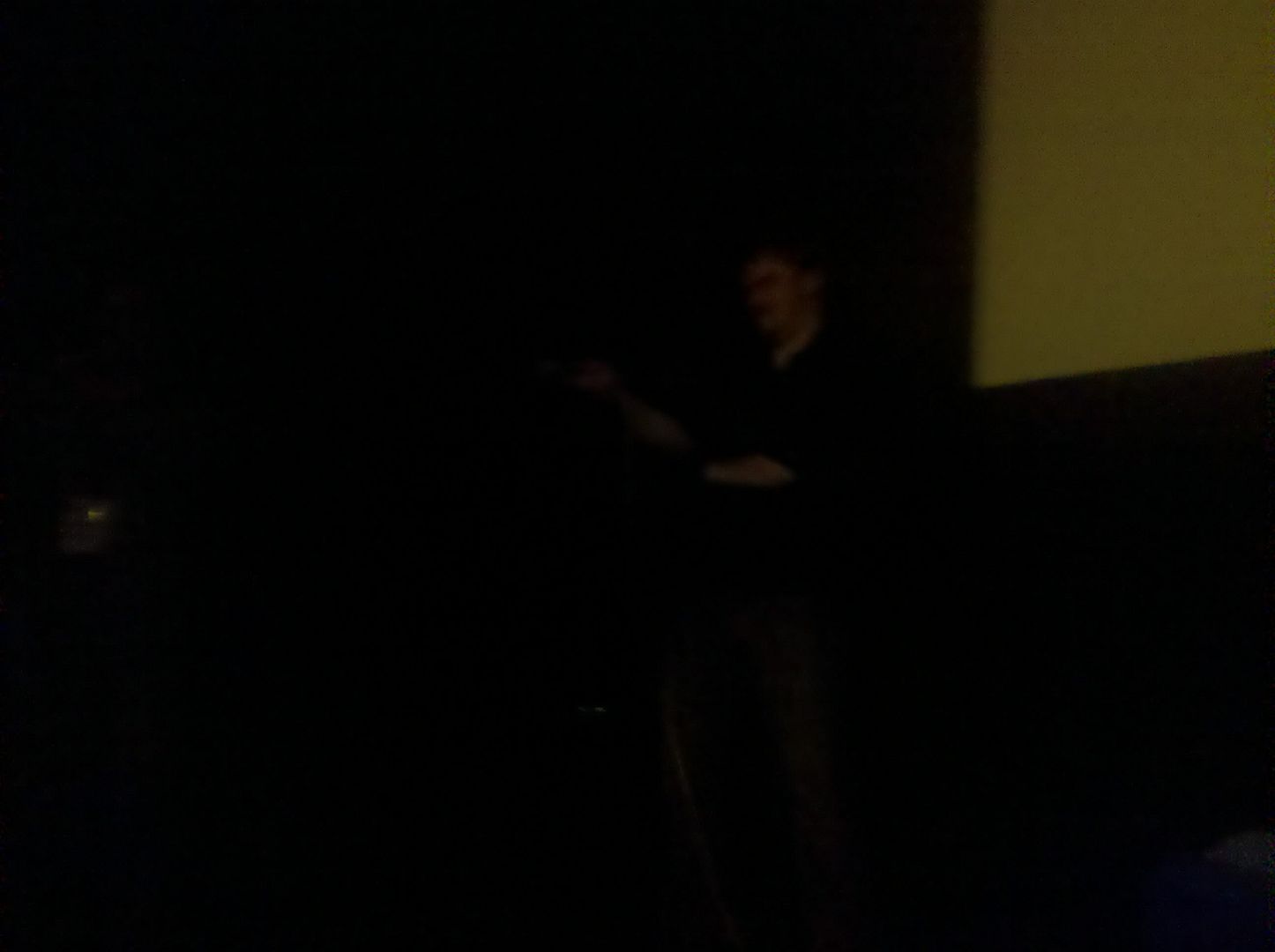Anyway, this was a long day that started late; the walk home from The Catechism Cataclysm the night before wasn't as bad as I remembered it from a couple years ago (and, wonder of wonders, there was actually a pizza place open when I went through Harvard Square! That serves really good pizza, even when closing at 2am!), but it did get me home at around half-past two, so after reading comics because the walking had my blood flowing too much for immediate sleep, it was something like 3:30am before I finally dropped. Apparently I got 15 minutes too much sleep, because I arrived at the Somerville Theatre too late for Convento at noon. The narrative shorts were scheduled to start at 12:15, and were a pretty good group, so I didn't feel too shortchanged.
(Especially after I read the program and read that it wasn't actually about monks installing robotics in dead animals to make them move again, but just a group of artists living in an abandoned monastery doing such things. A minor distinction, it may seem, but the monks would have made it much cooler, though Ned told me that it was, in fact, excellent anyway.)
I spent a bit of time talking with Ned between shows at the Brattle, where I spent much of the afternoon and evening watching a couple of interesting documentaries and one rather dire feature that we'll get to later. The docs were the science-for-the-socially-conscious ones that attract me and the folks with a vested interest, but are well worth the time for the curious. Both were full of good information. Both were short, which made time for long Q&As with filmmakers and experts.
(Aside: The other day, I saw a preview for a documentary on local people fighting coal mining which prominently featured images of windmills during the "there are alternatives! segment. Yeah, that's not a perfect solution.)
That left me there for The Future, a decision I regretted almost immediately. It was one of the two Chlotrudis presentations that day, and I skipped out on Trigger because, no matter how nice the recently-passed co-star had been to the group in the past, there was no way I was seeing a movie about "two grunge queens reuniting for one last show" if she wasn't my personal friend. Maybe it is as great as people have been saying, but... no. I should have said the same to The Future, which actually is more than a bunch of forced quirk trying to convince the audience of its significance, but that element is so far toward the forefront as to be suffocating.
I didn't realize it until after writing the reviews, but it's actually got a lot in common with Bellflower; both are movies that use fantastical tropes to dramatize the end-of-the-world feeling of a break-up. The thing is, Bellflower actually has characters with actual human emotions and reactions. I hated the people in The Future even when they were doing good things, but hoped for the best for the characters in Bellflower even when they were spiralling out of control. That one offered up cars shooting flames forty feet in the other air and the other offered up deliberately ridiculous dance was just the icing on the cake.
Sadly, I didn't get to see the car that shot the flames - though director Evan Glodell had "Mother Medusa" with him, it was going to take a while for it to warm up enough to shoot fire, and sticking around for the Bellflower Q&A meant getting into Stake Land was actually kind of a close thing - I honestly didn't even go out to the lobby; I just went straight from Theater #3 to #5 and found myself a seat pretty close to the extreme front.
As you can see, being up close didn't help with the photography when Jim Mickle came out to do a Q&A for Stake Land. Unless you've got a real camera with an eye-searing flash, you're just not going to get good pictures in those rooms. That's my story and I'm sticking to it.

Filmmakers and subjects of We Still Live Here: Âs Nutayuneân. The little girl is Jesse Littledoe Baird's daughter, being raised bilingual as the first native speaker of Wampanoag in over a century.

Filmmakers and experts for Windfall. An interesting movie and a spirited Q&A. I always find it amusing that activists in the audience always ask the filmmakers if they plan to make a sequel about this thing that got shorts shrift in the documentary; I strongly suspect that most documentarians would rather focus on anything else next after spending 5+ years immersed in one subject.

Mickle's a nice guy, staying to answer questions until around 2am and talking about making the movie (it's good to find a guy with a train!). Stake Land opens at the Brattle on June 17th and hits video about a month later.
Shorts 3: Narratives
Seen 30 April 2011 in Somerville Theatre #2 (IFFBoston 2011)
This is a pretty solid selection of short films, with no particular theme to them beyond maybe something about victimization. And improper urination, although that only lasted through the first three or so. Still, once you get to that third, you do start to wonder if the festival programmers are having a bit of a laugh at this. Anyway, I thought the group peaked with the first movie, although it was other things that won the awards.
"Deeper Than Yesterday" - This one was my favorite, putting us inside a Russian submarine that has clearly been out to sea longer than is particularly healthy for its crew's sanity. Director NAME gives us a strong feeling of walls closing in, with even the main character who tends to break fights up starting to lose it, before something strange happens. At that point, we're in the characters' heads enough that it's not hard to start thinking that there wouldn't be much actual harm in exploiting the situation. It's a nifty, well-polished story that avoids melodrama despite its somewhat bizarre plot device.
"Boy" - A fairly simple rite-of-passage story, as a young boy spending the day with his farmer dad spends a lot of time practicing shooting but finds the real thing to be a bit different. Nice-looking and straightforward.
"Baby" - A woman intervenes in a mugging, only to have the perpetrator start following her onto the bus. It's not a bad little story about intimidation, shifts in the balance of power, and how the application of the ability to do harm to others must be managed extremely carefully. My biggest complaint here is less about the film than the "short package" format; the last twist in this one deserves a little bit of time to sink in, which a quick jump to the next short doesn't get you.
"The Strange Ones" - That next one is a prize-winner, and another one that trades on an ambiguous ending that merits some mulling time. In it, a young man and a boy run out of gas and start walking, stopping at an isolated motel. The young woman watching the place tries to help, but something the angry kid says makes her very unsure what to do next. It's pretty good for a movie that builds not to a climax but a question mark.
"Fracture" - Believe it or not, this French short was close to the only thing at the festival that I saw on film. In it, a man on vacation with his wife and daughter starts to feel his irritation at the life he finds himself in grow. It's a slow build, believably portrayed, which does a surprisingly good job at keeping the ending from feeling like it comes out of nowhere.
We Still Live Here: Âs Nutayuneân
* * * (out of four)
Seen 30 April 2011 at the Brattle Theatre (IFFBoston 2011)
A few years ago, one of the documentaries that played IFFBoston (on, I believe, the same screen at roughly the same time) was a film by the name of The Linguists, about linguists seeking out dying languages before they disappeared forever. This time around, we look at whether these languages must necessarily remain dead, or whether they can be revived.
The language in question is Wampanoag (wom-pah-nog), spoken by the peoples of the same name in what is now Massachusetts. The last native speaker died over a hundred years ago, but one night Jesse Littledoe Baird, a Mashpee Wampanoag, has a dream about her people returning, and she is later inspired to study and learn more about the language. She is soon studying linguistics at MIT, alongside Ken Hale, a much-respected linguist whom she had previously snapped at when he came to the island to offer his assistance. They wind up developing mutual respect and friendship, though, and find that Jesse's quest is far from a lost cause, as there are written records and similar languages to draw from.
Comparative linguistics is probably not the sexiest of the soft sciences; it relies on minutia and specialized notation, and unlike the subjects of The Linguists, Baird isn't goiing to far-flung locations. Filmmaker Anne Makepeace assists Baird and linguist Norrin Richards in explaining the theory and the practice of reconstructing a language (Hale, sadly, passed away before filming), and they prove to be fine teachers. We see some of the more academic, theoretical work, but also get clear explanations of how Biard would use what data is available to piece together what the Wampanoag word for something would be.
Full review at EFC.
Windfall
* * * (out of four)
Seen 30 April 2011 at the Brattle Theatre (IFFBoston 2011)
Windfall was not quite the movie I expected to see. The usual narrative about wind power here in Eastern Massachusetts involves liberals who support green energy until it threatens to become a part of their expensive sea views, and though the movie seems to start from this perspective, it soon shows that wind turbines are becoming big business, with all the unsavoriness that can entail.
The film focuses on the town of Meredith, New York. It's a scenic place, although like many farming communities, it has seen more prosperous days. It does, however, feature strong and regular wind. An Irish power company, Airtricity, expresses interest in building some turbines there. One of the first people they make an offer to is Frank Bachler, a beef farmer who also serves as town supervisor, and who at least initially doesn't think it's a big deal until he mentions it to neighbor Ken Jaffee over coffee. Jaffe, a retired physician, isn't nearly so sanguine about this, and soon there are meetings being held, and an angry debate pitting neighbors against each other.
Certainly, a lot of what we see initially comes down to "Not In My Back Yard", but it soon becomes clear that NIMBYism isn't all that's at work. As townspeople and director Laura Israel dig deeper, they discover a number of concerns, both about the effect having these turbines in a community may have on the residents' quality of life and the entangled politics and business of building them. It turns out that there are many reasons to be skeptical about whether the benefits of wind farms outweigh their negative impact in many situations, and that's before getting to what appears to be an inherently corrupt system of private companies making generous offers to town leadership so that they will hopefully grease the way through the system.
Full review at EFC.
The Future
* ½ (out of four)
Seen 30 April 2011 at the Brattle Theatre (IFFBoston 2011)
The Future is kind of amazing, in its annoying little way. It finds the shortest possible path from its characters doing something nice to them being ridiculous and insufferable, and then spends the next hour or so finding ways to make them more aggravating. What's worse, filmmaker Miranda July can't just make a movie about unpleasant people; she has to try and be clever.
Sophie (July) and Jason (Hamish Linklater) have just rescued a stray cat, whom they name "Paw-Paw" and who serves as our narrator. One of the cat's legs is broken, so it will have to stay at the animal shelter for a month. Upon getting home, they realize that this means they're settling down, which scares them, so they decide to quit their jobs (which they don't much like anyway) and spend the next thirty days doing something fulfilling. For Jason, this means going door to door selling trees for an environmental initiative; for Sophie, posting a new dance clip on YouTube every day. They get distracted, though - Jason by a nice but lonely old man who sells him a hairdryer on craigslist (Joe Putterlik) and Sophie by Marshall (David Warshofsky), who is on the other end of a phone number she stumbles upon.
I'm sure many couples have the idiotic conversation that sets this movie into action at some point or another, but even the ones without the self-awareness to realize how spoiled they sound will recognize that their grand plan doesn't actually make any sense. Not Sophie and Jason, though - they go an do things like canceling their internet access for no reason other than forcing an issue in their movie's contrived plot (Sophie needs to feel properly isolated and lonely as she does her ridiculous dance thing). Even if you grade on a curve for the movie being full of off-beat, exaggerated characters, nothing that these people do has a good reason behind it.
Full review at EFC.
Bellflower
* * * (out of four)
Seen 30 April 2011 in Somerville Theatre #3 (IFFBoston 2011)
The end of a relationship can certainly seem like the end of the world, and while Bellflower is not explicitly post-apocalyptic, it takes a number of its cues from that direction. It's not the first love story to do so, but it does an impressive job of hammering its particular point home: It may be easier to deal with the whole world falling apart than the end of things with that one other person.
Woodrow (Evan Glodell) and Milly (Jessie Wiseman) don't really meet cute, unless you count competing against each other in an insect-eating contest at the Mad Dog bar cute. They hit it off, though, and after a first date that involves driving from California to Texas for the worst diner food Woodrow has ever seen - which best friends Aiden (Tyler Dawson) and Courtney (Rebekah Brandes) don't find hugely out of character, although it seems to annoy Milly's roommate Mike (Vincent Grashaw) - things seem to be going pretty well. The thing is, when the people in a relationship either build flamethrowers in their copious spare time or have a long history of self-destructive behavior, two thing can happen: Either they'll be a perfect match, or the end and fallout will be ugly. Maybe too ugly to make things right.
Bellflower makes a series of big-time right turns in the middle, and while they don't completely come out of nowhere, their suddenness is as much a punch in the gut as it is fitting. The first half of the movie is a wild love story, full of impulses and grand gestures, but genuine enough to get the audience genuinely invested in Woodrow and Milly. Glodell and Wiseman have quick and excellent chemistry, and the characters complement each other well; even the audience that isn't big on matching tattoos, modifying a car to dispense whiskey from its dashboard, or looking for trouble can appreciate the happy effect these two have on each other.
Full review at EFC.
Stake Land
* * * (out of four)
Seen 30 April 2011 in Somerville Theatre #5 (IFFBoston 2011)
Jim Mickle's first feature (also with co-writer/star Nick Damici), Mulberry Street, was as low-budget and do-it-yourself as you're going to see, and pretty impressive even when not grading on that sort of curve. Stake Land doesn't quite represent a move up to the big leagues for Mickle, but offers a pretty strong case that he deserves to be there sooner rather than later.
There's a zombie/vampire virus going around, spreading fast and far enough that American society has more or less collapsed. On a micro level, that means Martin (Connor Paolo) watching his family get wiped out, surviving mainly because of the timely appearance of "Mister" (Nick Damici), who is just a vampire-slaying machine. He takes Martin along with him, training him to fight the infected. They're on the road to New Eden, up in Canada, but vampires aren't the only monsters they'll have to face along the way: Jebedia Loven (Michael Cerveris) is a doomsday preacher reveling in doomsday actually coming. Mister's and Martin's path will take them through Loven's territory, picking up new companions along the way - a pregnant girl (Danielle Harris), a good-hearted nun (Kelly McGillis), and a disgruntled veteran (Sean Nelson).
Just as Mulberry Street was basically a zombie siege movie with some interesting details, Stake Land is a post-apocalyptic road movie that's a little bit more clever than the vast majority with the same template. At some points, a lot more clever - like an actual virus, the vampire plague mutates and has different symptoms, and rest assured, when the narration mentions people loading vampires onto helicopters and then dropping them on enemies like bombs, you will get to see it and it is pretty darn cool. Mickle and Damici have a nice handle on using the structure of the road and horror movies to switch between focusing on Martin and Mister alone as well as add other perspectives on the world they now live in; they also do an unusually good job of working characters back in when they might usually be left behind.
Full review at EFC.
No comments:
Post a Comment